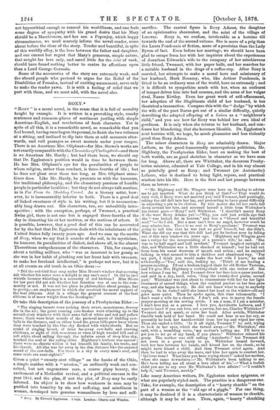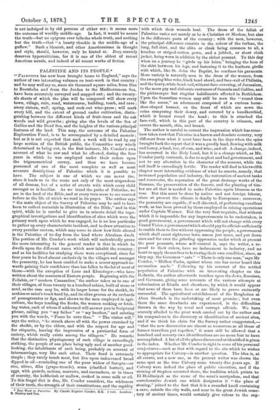ROXY.*
"Boxy " is a moral novel, in the sense that it is full of morality taught by example. It is written in a provoking style, cranky
sentences and common-places of sentiment jostling with simple American-English, and revelations of fresh character. Yet in spite of all this, it is a remarkable novel, so remarkable that you feel bound, having once begun its perusal, to finish the two volumes at a sitting, and inclined to dip into them at odd moments after- wards, and roll passages as sweet morsels under your tongue. There is no American Mrs. Oliphant—for Mrs. Stowe's works are
not exactly comparable with the Chronicles of Carling ford—and there is no American Mr. Hardy ; but had there been, we should say that Dr. Eggleston's position would in time be between them. He has Mrs. Oliphant's eye for the peculiarities of people to whom religion, rather than conduct, is three-fourths of life ; but he does not gloat over them too long, as Mrs. Oliphant some- times does. Like Mr. Hardy, he presents us with the humours, the traditional philosophy, and the elementary passions of humble people in particular localities ; but they do not always talk maxims, as in Far From the Madding Crowd. As a literary artist, how- ever, he is immeasurably inferior to both. There is a good deal of linked sweetness of style in his writing, but it is unconscion- ably long drawn out. His characters, too, are unhealthily intro- spective ; with the exception, perhaps, of Twonnet, a practical Swiss girl, there is not one but is engaged three-fourths of the clay in dissecting his or her motives, or the motives of others. It is possible, however, that a good deal of this can be accounted for by the fact that Dr. Eggleston deals with the inhabitants of the United States fully twenty years ago. And we sum up the merits of Roxy, when we say that it smacks of the soil, in its mysticism,
its humour, its peculiarities of dialect, and above all, in the almost Theocritean outspokenness of the characters. This, for example, about a tattling milliner, who " was as innocent in her gossip as she was in her habit of plucking out her front hair with tweezers, to make her forehead intellectual," is perhaps not new, but it is at all events an old truth in an Ohio dress :—
" Did the red-bird that sang under Miss Moore's window that morning ask whether his notes were a delight to any one's ears ? Or did he just whistle because whistling is a necessity of red birdism ? Miss Moore for her part did not ask whether her function was of use to the com- munity or not It was not her place to philosophize about gossips, but to gossip,—an employment in which she received the moral support of the best citizens. And in a village the general consent of the best citizens is of more weight than the decalogue."
Or take this description of the journey of a Presbyterian Elder:— "The singing locusts were making their sweet, monotonous, drowsy in in the air ; the great running rose-bushes were climbing up to the second-story windows with their arms full of white and red and yellow roses; there were faint sounds of the pastoral music of tinkling cow- bells in the distance, and on either hand the green bills grew hazy whore they were touched by the blue sky flecked with white clouds. But no sound of singing locust, of faint far-away cow-bells and crowing chickens, or sight of rich rose-trees or vista of high wooded hill and of soft white cloud sailing through the infinite ocean of deep blue sky, touched the soul of the ruling elder. Highbnry's horizon was narrow ; there were no objects within it but himself, his family, his trade, and his church. All else was far away in the dim distance like the unnoted sound of the cow-bells. For there is a sky in every man's soul, and some souls are near-sighted."
Given a quiet " county-seat village " on the banks of the Ohio, a simple maiden with a " mission," an ordinarily weak and con- ceited, but not ungenerous man, a coarse gipsy beauty, the excitement of a Methodist revival, and apolitical canvass in the year 1844, and the plan, if not the plot, of Boxy may be easily Inferred. Its object is to show how weakness in man may be purified into humility by sin and suffering, and saintliness in woman, developed into genuine womanliness by love and self- * Rory. By Edward Eggleston. 2 vole. London: Chatto and Windas. sacrifice. The central figure is Boxy Adams, the daughter of an opinionative shoemaker, and the saint of the village of Luzerne. Boxy is, we confess, intolerable as a heroine till towards the end of the second volume. She is more of a prig than the Laura Pendennis of fiction, more of a precisian than the Lady Byron of fact. Even before her marriage, we should have been glad to escape from her with her inquiries about the experiences of Jonathan Edwards's wife to the company of her mischievous . little friend, Twonnet, with her paper balls, and her searches for a suitable husband in the dregs of a coffee-cup. After Rosy is married, her attempts to make a moral hero and missionary of her husband, Mark Bonamy, who, like Arthur Pendennis, is fitted to be an ordinary man of the world, bore us extremely ; and it is difficult to sympathise much with her, when an outburst of temper drives him into bad courses, and the arms of her vulgar rival, Nance Kirtley. Even her great work of self-effacement, her adoption of the illegitimate child of her husband, is too theatrical a transaction. Compare this with the " dodge " by which the wife of the poet Burns got out of a similar difficulty, quietly describing the adopted offspring of a liaison as a " neighbour's child," and you see how far Rosy was behind her own ideal of goodness. It is only when she returns to her husband, and con-
fesses her blundering, that she becomes likeable. Dr. Eggleston's next heroine will, we hope, be much pleasanter and less violently good than Roxy Adams.
The minor characters in Roxy are admirably drawn. Major Lathers, as the good-humouredly unscrupulous politician, Mr. Highbury, the Presbyterian Elder, bent on making the best of both worlds, are as good sketches in character as we have seen for long. Above all, there are Whittaker, the decorous Presby- terian minister, educated at Yale College, and in his way almost as painfully good as Roxy ; and Twonnet (or Antoinette) Lefaure, who is destined to bring light, repose, and practical wisdom into his life. Here is the first and last passage between
them as lovers :-
"' Mr. Highbury and Mr. Wingate were here on Monday to advise me to get married. What do you think of that ?'—' That would do very well, if Roxy were not married yet,' said Twonnet, half pontingly, taking the old doll into her lap, and pretending to have great difficulty in adjusting a pin in its clothes. By this means she let her curls fall down around her face, and screened herself a little from Whittaker's too intent gaze.—' Roxy !' said Whittaker. I shouldn't marry Roxy if she were Roxy Adams yet.'—' Why, you said just awhile ago that she was looked for in heaven," and was a "blessed and beautiful soul." So I did. But a man can't love an angel, however much he may admire her. There is no rest to Roxy's goodness.' Twonnet was going to tell him that he was just as good himself, but she didn't. What she did say was that this doll had got its broken nose by falling out of this very window six years ago. Highbury and Wingate gave me a recipe for the compounding of a parson's wife,' he said. 'She was to be half angel and half sawdust.' Twonnet laughed outright at this, and Whittaker was a little shocked at himself ; but he bad cut loose from his usual decorum of speech and action ; and he enjoyed talking in what seemed to him a reckless and abandoned way. For my part, I think you would make the best wife I know,' he said awkwardly.—'Yes,' said she, looking up. 'Think of me leading a prayer-meeting. I'd set a broken-legged chair for old Mother Tartrum, and I'd give Mrs. Highbury a rocking-chair with one rocker off. See how solemn I can be.' And Twonnet drew her face into a queer pucker, and said in a dry, hard, voice, Sing the twenty-first psalm, second part.' Whittaker was just about to remonstrate with her for her light treatment of sacred things, when the comical pucker on her face gave way, and she began to cry. He did not know what to say to anybody crying. So be waited until she leaned her head on the window-sill and grew more quiet. Then he spoke again, this time vehemently. ' I don't want a wife for a church. I don't ask you to marry the female prayer-meeting or the sewing circle. I am a man, if I am a minister. I don't love you as a parson. I love you, Antoinette Lefaure, and I want to know if you can love, not a parson, but me, Charles Whittaker ?' Twonnet did not speak, or raise her head. After awhile, Whittaker timidly took hold of her hand. He could not bear to see her cry, so presently he took her handkerchief from her lap and wiped her eyes. Then she smiled a little. 'Is it all right, Twonnet ?' he said, trying to look in her eyes, which she turned away.' Mr. Whittaker,' she said, with a trembling voice, ' my mother's calling me. I71 have to get you to let go of my band, if you please.' Whittaker relaxed his grasp. The mother was still calling Antoinette but Twonnet did not seem in a great hurry to go. Whittaker leaned forward, took her face between his bands, and kissed her on the cheek, as he might have kissed a child. And then Twonnet cried again. And then he bad to wipe away the tears, and kiss her again to comfort her. Qu'avez vous ? What have you been crying about ? ' asked her mother, when she came downstairs.' Mr. Whittaker's been talking to me. He's been telling me all about a love affair of his.'—' What a foolish
child you are to cry over Mr. Whittaker's love affairs ! couldn't help it,' said Twonnet, meekly."
Like many American writers, Dr. Eggleston makes epigrams, or what are popularly styled such. The practice is a dangerous one. Take, for example, the description of a " hearty chuckle " on the part of a woman as the "old age of a giggle." For one thing, it may be doubted if it is a characteristic of women to chuckle, although it may be of men. Then, again, " hearty " chuckling is not indulged in by old persons of either sex ; it seems more the outcome of worldly middle-age. In fact, it would be nearer the truth—but no epigram ever tells the whole truth, and nothing but the truth—that " a hearty chuckle is the middle-age of a guffaw." Such a blemish, and other Americanisms in thought and style, should, however, only be hinted at. Rory scarcely deserves hypercriticism, for it is one of the ablest of recent American novels, and indeed of all recent works of fiction.



































 Previous page
Previous page